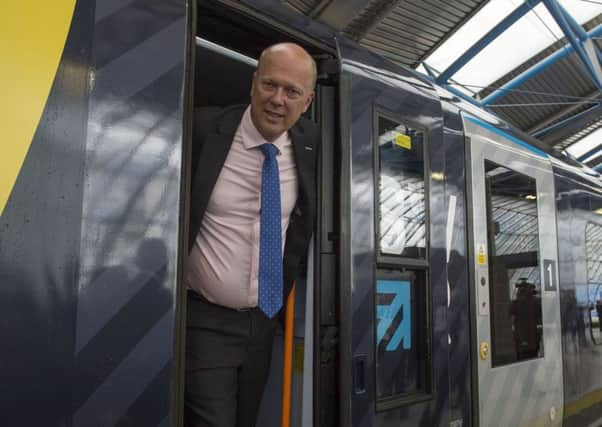Chris Grayling: How I plan to get transport back on track in North


The article yesterday bemoaned figures about investment in the North, yet it promoted a truly misleading report from IPPR North. I intend to highlight the failures in that report.
But first I must defend our record. By 2020, this Government will have spent over £13bn improving and modernising Northern transport. It was this Government that set in motion the Northern Powerhouse. It was this Government that appointed a Minister to focus on realising the untapped economic potential of our great towns and cities. And it was this Government that established Transport for the North – and provided £60m to develop a comprehensive vision for Northern transport and drive those projects forward.
Advertisement
Hide AdAdvertisement
Hide AdOur commitment to Northern transport has never been stronger, and I believe the evidence is compelling.
First, we are committed to improving journeys on the TransPennine route, with state-of-the-art trains, longer carriages and more frequent services.
We are planning to spend around £3bn to upgrade this key route between Manchester, Leeds and York – one third of our budget for rail enhancements between 2019 and 2024.
We’re building HS2 – a £55bn network which will transform connections between eight out of 10 of Britain’s biggest cities, including Sheffield, Leeds and York. For Yorkshire alone, that means thousands of extra seats on commuter services every day, space freed up on the existing railway for new, faster and more frequent journeys to the East Midlands, Birmingham and London, and plans for new 30 minute services between high-speed stations in Leeds and Sheffield city centres.
Advertisement
Hide AdAdvertisement
Hide AdEven if you’re not a passenger, you stand to benefit from the 100,000 jobs and 2,000 apprenticeships created by HS2 and the better connections it will bring, as well as career opportunities at the High Speed Rail College in Doncaster.
Crucially, we’re also spending £300m to ensure HS2’s infrastructure could accommodate Northern Powerhouse Rail, an east-west rail line connecting Liverpool, Manchester, Leeds, Sheffield and Hull. That comes on the back of a commitment to scrap the old Pacer trains, and ensure all trains are completely new or refurbished by 2020.
In an era where technology is evolving rapidly, it is thanks to new bi-mode trains and their use of alternative fuels that needless and disruptive electrification works between Nottingham and Sheffield can be avoided.
On Yorkshire’s roads we are spending over £2.9bn on 42 major schemes, including the widening of the M62 to four lanes between Leeds and Manchester, completing the final phase of the Great Yorkshire Way to improve access to Doncaster Sheffield Airport and supporting the regeneration of Halifax and Huddersfield with improvements along the A629.
Advertisement
Hide AdAdvertisement
Hide AdOn public transport, we are improving journeys while investing in the most environmentally responsible technology. That is why York is receiving funding to become a Go Ultra Low city; why Sheffield is benefiting from over £1.3m for a low emission bus scheme; and why West Yorkshire has been granted over £2m to promote electric taxis.
I stand by my original point that this Government is delivering unprecedented investment in northern transport. But yesterday’s IPPR North report woefully distorted that investment.
By focusing on spending figures beyond 2021, as IPPR North did, they totally ignore several large spending areas, such as rail and road maintenance and renewal.
Moreover, their inclusion of Transport for London projects which receive no central government funding appears to be a deliberate attempt to distort our investment in the North.
Advertisement
Hide AdAdvertisement
Hide AdIn fact, planned central government transport investment shows that spending in the North per person is higher than in the South – £1,039 compared to £1,029.
I therefore absolutely refute any accusation that we are leaving the North to solve its own problems. Rather than talking down the North, IPPR should recognise the opportunities ahead.
On April 1, Transport for the North will become the first sub-national transport body, meaning local authorities and business will have the power and autonomy they have asked for in order to shape their own transport vision. We look forward to working together, building the strongest business case possible and setting out a transformative vision for Northern transport.
I would never deny that the North’s inadequate transport connections have held the economy of the region back for too long, but there will also be no rowing back on our commitments and no let-up in our effort to undo decades of underfunding.
Chris Grayling is the Transport Secretary.